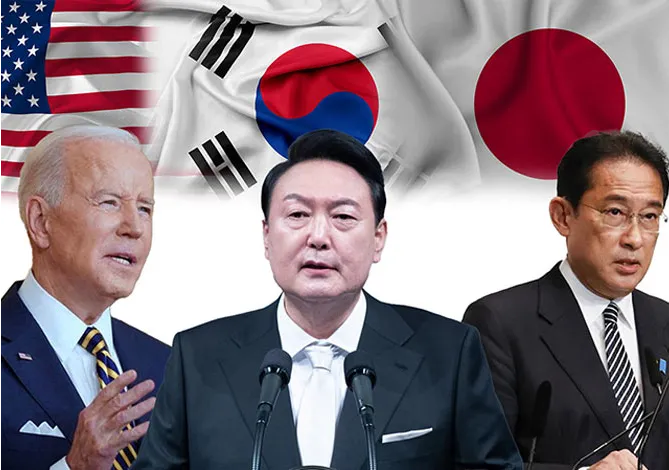
Will Camp David redefine Northeast Asian Security? It certainly encapsulates a definitive moment in the Northeast Asian strategic landscape. Yet, the key question remains: How consequential will the United States (US)–Japan–South Korea Trilateral prove to be in upholding the rules-based regional order, and winning President Biden’s ‘competition between democracies and autocracies’?
While Beijing is upending the US-led regional order in East Asia and a China-Russia-North Korea alignment is taking shape, Washington on August 18 has managed to decisively demonstrate its firm resolve to maintain a favourable strategic edge by making its Asian alliance network more effective. Washington’s desire for a robust trilateral security cooperation can be traced back to the 1969 Nixon-Sato Korea Clause. As the US–Japan–South Korea institutionalise their Trilateral across the leadership level including setting up an Indo-Pacific Dialogue, its success will be contingent on making it more resilient to domestic politics, specially the unresolved historical memory and perception politics between two of Washington’s key East Asian allies.
[pullquote]Washington’s desire for a robust trilateral security cooperation can be traced back to the 1969 Nixon-Sato Korea Clause.[/pullquote]
While Japan’s 2022 National Security Strategy (NSS) identifies Seoul as a ‘highly important neighbouring country’ with reference to regional security, South Korea’s 2023 NSS underscores the urgency of bolstering cooperation with Tokyo on regional and global matters. It argues the case of ‘normalising Korea-Japan relations’ and further accelerating the momentum on the economic and security verticals. With the change of guard in South Korea, high-powered diplomacy is unfolding between Tokyo and Seoul. They have fully restored military intelligence-sharing under the General Security of Military Information Agreement (GSOMIA) and the trade war is cooling off with Japan restoring South Korea to its list of preferred export destinations, and further advancing policy dialogue on export control. Nevertheless, domestic political constituencies, especially the progressive camp in South Korea remains sceptical about Japan. Similarly, balancing the factional politics within Japan’s Liberal Democratic Party, especially the conservative plank, may pose a challenge to Kishida’s efforts.
Meanwhile, the US–Japan–South Korea Trilateral certainly touched a nerve in Beijing with its reference to Taiwan in the Spirit of Camp David Statement. It is evident from China’s critique, where Washington is accused of stoking a Cold War mentality with cliques including AUKUS, the US–Japan–South Korea and the Quad while China is projected to be pursuing solidarity and economic integration with the Regional Comprehensive Economic Partnership (RCEP) and the Comprehensive and Progressive Agreement for Trans-Pacific Partnership (CPTPP).
[pullquote]Balancing the factional politics within Japan’s Liberal Democratic Party, especially the conservative plank, may pose a challenge to Kishida’s efforts. [/pullquote]
While the US October 2022 National Security Strategy (NSS) maps Beijing as ‘the only competitor with both the intent to reshape the international order and, increasingly, the economic, diplomatic, military, and technological power to advance that objective’, Japan’s December 2022 NSS identifies China as an ‘unprecedented and the greatest strategic challenge’ for Tokyo. Japan’s strategic designs in rejecting the advent of a China-centric order is deeply embedded on its post-war alliance with the US. The NSS further beefs it up with a ‘multi-layered network’ among allies and like-minded countries including Australia, India, South Korea, Europe, ASEAN, NATO on the one hand, and leveraging the trilateral frames like US–Japan–South Korea and US–Japan–Australia on the other.
Kishida has effectively designed the narrative of ‘Ukraine today can be East Asia tomorrow’ (with reference to flashpoints like Taiwan and the South and East China Seas) and succeeded in coalescing the two security theatres of Europe and Indo-Pacific. As Japan sits on the frontline of East Asian security, it has rewired its NSS—getting counter-strike capabilities, doubling defence spending to 2 percent of GDP, and mainstreaming economic security. Tokyo’s evolving character as a strategic actor will markedly determine the power balance in the Indo-Pacific.
[pullquote]Japan’s strategic designs in rejecting the advent of a China-centric order is deeply embedded on its post-war alliance with the US.[/pullquote]
While South Korea’s 2023 NSS identifies North Korea as its top security priority, the domestic debate on China is more nuanced. As Seoul defines its ambition to be a Global Pivotal State, its goals align with Washington as it ‘commits to joining hands with the international community to safeguard universal values, such as freedom, human rights, and the rule of law, and to uphold the international order based on rules and principles.’ President Yoon Suk Yeol’s NSS argues the case of cultivating a ‘healthier and more mature relationship built on mutual respect and reciprocity’ with Beijing, and advocates that Terminal High Altitude Area Defense (THAAD) deployment is a matter of security sovereignty. President Yoon has refused to inherit the ‘Three Noes’ that Beijing negotiated in 2017 with the previous Moon Jae-in administration encompassing (a) No additional THAAD systems (b) No participation in American missile defence networks, and (c) No trilateral military alliance with Washington and Tokyo. This latest Trilateral dilutes the Three Noes arrangement.
While the Yoon administration recognises the vitality of Beijing in addressing the North Korean nuclear challenge as well as economic dependency, Seoul is undoubtedly doubling down on bolstering its alliance with Washington on the one hand and revisiting its Japan policy on the other. Beijing’s economic coercion against Seoul has pushed President Yoon closer to Washington and Tokyo. China’s unfavorability in South Korea scaled from 37 percent in 2015 to 77 percent in 2023. It has strengthened trilateral military cooperation with Washington and Tokyo; for instance, the joint naval missile defence exercise bringing together destroyers equipped with Aegis radar systems, held to counter missile threats emanating from North Korea, or the trilateral meeting between military chiefs in Hawaii in July.
[pullquote]The Trilateral initiated an Early Warning System pilot to deepen information sharing and policy coordination on future disruptions to supply chains and pre-empt policy solutions to economic coercion.[/pullquote]
As de-risking of high-tech supply chains are redefining the power balance, all three have joined forces in the Indo-Pacific Economic Framework (IPEF), and the Chip4 alliance pushed by the US as a ‘democratic semiconductor supply chain’. At Camp David, the leaders mapped the significance of the Trilateral Economic Security Dialogue, and mainstreaming supply chain resilience, especially semiconductors and batteries, besides emphasising on technology security and standards. Notably, the Trilateral initiated an Early Warning System pilot to deepen information sharing and policy coordination on future disruptions to supply chains and pre-empt policy solutions to economic coercion. In order to avert siphoning off of cutting-edge technologies illegally, these three powers will initiate exchanges between the US Disruptive Technology Strike Force and its Japanese and South Korean counterparts to further enhance information-sharing across enforcement agencies.
However, maintaining stability in the semiconductor supply chain is proving to be one of the most complex challenges for policy planners as Washington is reportedly extending export waivers for Taiwanese and Korean chipmakers to avert global disruption. Leading businesses including Samsung Electronics, SK Hynix and TSMC lobbied hard with Washington since they have major production hubs in China. China hosts almost 40 percent of SK Hynix’s DRAM production capacity. Re-engineering the chip ecosystem away from China would take some time. Nearly a third of global semiconductor sales comes from China. It outstripped Japan in chipmaking capacity, just after South Korea and Taiwan. In addition, while China remains the largest trading partner to Japan and South Korea, and even Taiwan, it remains the biggest source of imports for the US.
[pullquote]Maintaining stability in the semiconductor supply chain is proving to be one of the most complex challenges for policy planners as Washington is reportedly extending export waivers for Taiwanese and Korean chipmakers to avert global disruption.[/pullquote]
Meanwhile, the Peninsula remains a fiercely contested theatre for the major powers, and denuclearisation is unfolding as one of the most defining challenges in shaping Northeast regional security. As Pyongyang ‘pose[s] a grave threat’ to the Korean Peninsula, the Trilateral aims to operationalise sharing of missile warning data on Pyongyang in real-time, even as they deepen ballistic missile defence cooperation countering North Korea’s nuclear and missile threats. Meanwhile, they have already done a maritime ballistic missile defence warning test in August for the real-time sharing of missile warning data. Additionally, cyber security is also becoming centre stage in the policy discussions, and the Trilateral has established a working group to address North Korea’s cyber threats.
While competing geopolitical and geo-economic interests define the strategic choices of the major stakeholders in Northeast Asian security landscape, the future of the Trilateral will hinge on two factors: First, the impending US election next year and how alliances are weighed in the national security conversation by the top contenders; and second, will Tokyo and Seoul be in lockstep despite domestic variables, be it the emotive war-time history issues or the furore over the release of the Fukushima waters?
Titli Basu is an Associate Professor at Jawaharlal Nehru University (JNU)
The views expressed above belong to the author(s). ORF research and analyses now available on Telegram! Click here to access our curated content — blogs, longforms and interviews.




 PREV
PREV


